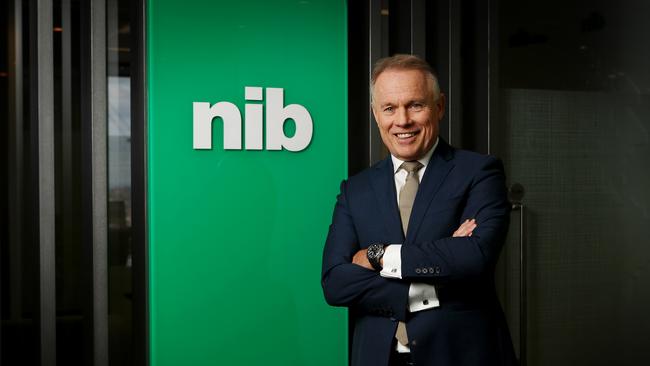NIB’s plan to stop hospital surgery rorts and boost affordability
NIB chief executive Mark Fitzgibbon says its time to stop paying doctors and hospitals purely on volume.

Doctors and hospitals should be paid on clinical outcomes rather than purely on volume, says NIB chief executive Mark Fitzgibbon as he unveils a new health care funding model that aims to slash waiting times and improve affordability.
Similar to executive remuneration - which involves a fixed salary and variable payments based on meeting certain performance targets - Mr Fitzgibbon believes the model will help strengthen Australia’s health system by curbing unnecessary procedures and costly revision surgeries.
“Whenever you pay based upon volume - just the theory of it, and I‘m not talking about Australian hospitals, Australian doctors - you’ll get more volume,” Mr Fitzgibbon said.
For example, the latest Australian Atlas of Healthcare Variation found the number of knee arthroscopy increased more than seven times depending on where a patient lived, with procedures ranging from 185 to 1319 per 100,000 people. Meanwhile, data from NIB subsidiary Honeysuckle Health revealed inpatient rehabilitation conversion rates varied from 20 to 94 per cent, placing greater cost on the health system.
“That‘s just one example of where the likelihood of somebody being admitted to hospital for rehab after a major joint replacement of how wildly it can vary, just depending upon the choice of the doctor or the practice of the hospital. And we have to correct that because it’s clearly inefficient,” Mr Fitzgibbon said.
“As a company we‘re very interested in working more closely with healthcare providers to think about how can we create a new remuneration structure for the future, which rewards you for better health outcomes rather than volume.”
“(Instead of) saying ‘we‘re going to give you $10,000 for Jack’s knee replacement, and we don’t care what the outcome is but that’s what you’re getting’, a better system would be we’re going to give you a bunch of money: $8000 or $12,000 - $12,000 if Jack reports improved health outcomes, and only $8000 if Jack reports moderate outcomes.”
It comes as NIB net profit has surged 25 per cent to $81.4m, thanks to a 2.8 per cent lift in policyholders across its Australian business in the six months to December 31. Meanwhile, revenue jumped 8.3 per cent to $1.4bn.
Mr Fitzgibbon said while the results “look quite spectacularly good” they needed to be “treated with some caution”. “There is an obvious a Covid impact on that”.
Pre-pandemic private health insurers were battling a tide of members - mainly the young and healthy - ending their policies. But during Covid, insurers have generated record profits - totalling $1.8bn last year - as the lockdowns and elective surgery bans cut the number of benefits paid.
In an effort to generate value post pandemic and grow the sector, Mr Fitzgibbon believes there are two key areas of reform: the new funding model as well as adjusting the “risk equalisation” pool so it doesn’t financially penalise younger members.
Last week Catholic Health Australia - which represents St Vincent’s, St John of God and other hospitals - urged for the government to remove the Medical Levy Surcharge exemption on “basic” health insurance cover, branding the polices as “junk”, which wealthier Australians use as a tax dodge.
But Mr Fitzgibbon said basic cover was used by younger people and removing the MLS would drive them away, putting more pressure on the public system as they got older. A better solution, he said, would be reforming the risk equalisation pool to create more value for younger people and incentivise them to maintain their cover.
“We have a product we sell for $1200 a year. Now of that product, almost $1000 goes bang straight into risk equalisation, it’s gone.
“We sell a comprehensive product that covers everything to a foreign student for about $600. Imagine if we were able to sell that comprehensive product to an Australian younger person for $600.
“Then people say ‘hold on, but then the subsidy is lost for the oldies”. Well, no. Let‘s reconfigure the subsidy, the government subsidy level, to look after the oldies more directly.”
As for health insurers profiteering from the pandemic, Mr Fitzgibbon said “nobody can objectively accuse the industry of making too much money because we really don‘t know what level of deferment has occurred” from pandemic-induced shutdowns and elective surgery restrictions.
He said most people were likely to postpone rather than cancel many procedures, with NIB setting aside almost $60m in “catch-up” costs. In the meantime, the group has deferred its 2.66 per cent annual premium increase until September as well as “rebated premiums”.
“We recognise the pandemic is taking its toll on people and value our total support package at over $90 million,” Mr Fitzgibbon said.
Jarden analyst Kieren Chidgey said losses across NIB international inbound health (IIHI) insurance and travel divisions, which worsened $7.4m and $7.9m respectively, offset its stronger Australian health insurance (ARHI) earnings.
“Whilst ARHI delivered stronger 1H22 profits due to Covid-related tailwinds, increasing losses across IIHI and Travel outweighed. With international travel now resuming given the easing of border restrictions, we expect a return to profitability in FY23E though higher 1H22 losses suggest 2H22E could see moderate losses,” Mr Chidgey wrote in a note to investors.
“While ARHI could provide continued support near term, with underlying net margins running in line with NIB’s 6-7 per cent target and JARDe (6.5 per cent FY22E) and policy growth
guidance unchanged, underlying earnings momentum appears to be tracking in line.”The group will pay an interim dividend of 11c a share, fully franked, on April 4.




To join the conversation, please log in. Don't have an account? Register
Join the conversation, you are commenting as Logout